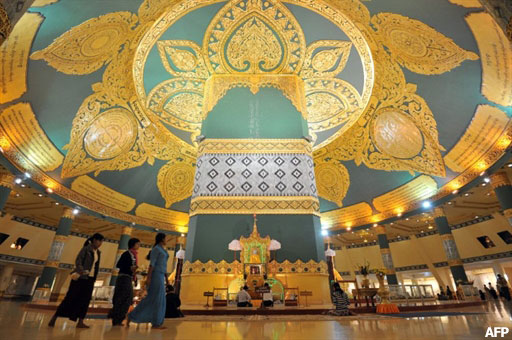Chiang Mai (Mizzima) – Getting a job can be an uphill struggle at the best of times in Burma. But when it comes to applying for a government job, the scales are stacked heavily in favour of those with government connections or a track record with the military.
Jobs working in Burma’s government bureaucracy are in demand as they offer a steady salary, security and occasional perks in an economy that has long been lacklustre and suffers from a high level of unemployment.

For most of the 25,000 people who recently applied for 200 positions with the Township Administrative Office under the Ministry of Home Affairs, however, actually snagging one of these government jobs proved an almost impossible mission.
The challenge for the applicants was not immediately apparent. Not only were the odds stacked against applicants due to the large numbers––working out at 125 people applying for one job. The main hurdle proved to be who you know and your affiliation.
Most of the standard processes in Burmese society––getting an education, a job, renting an apartment, obtaining a business contract––involve paying bribe money or knowing people in positions of power, or being part of the military-run government apparatus. After almost 50 years of military-government rule, these practices are embedded in everyday life. Little surprise, therefore, that Burma ranks almost rock bottom in Transparency International’s Corruption Perceptions Index, alongside the war-torn and virtually failed state of Afghanistan.
Out of the 25,000 people who recently applied for the government vacancies, 8,500 were shortlisted for the job entrance exam, a rather high number. The exam sought to assess the applicants’ competence in Burmese language, English and general knowledge. But it appeared from the thousands who turned up to sit the exam in the capital Naypyitaw, the challenge was worth taking, despite the costs and problems of finding or paying for accommodation and food in an expensive city still in the throes of development.
In Naypyitaw, hotels are very expensive, so most of the applicants tried to stay at the Municipal Guest House, which is the cheapest accommodation in the capital and can house 6,000 guests. It charges 1,500 kyat (US $1.75) for a single room. But actually finding a room was hard because the new capital was crowded with job applicants, gems merchants and other visitors.
The rooms of the guest house were available on a first come, first served basis, so the latecomers had to wait until rooms became available or seek refuge in the garden or in nearby Buddhist monasteries.
Added to the problem of finding accommodation, the cost of food in Naypyitaw is high with a typical meal costing around 1,500 kyat. For those seeking to find a cheap meal, one option is to visit Pyinmana, a few miles away, but although a typical meal of monhinga or noodles costs 500 kyat here, the motorcycle taxi fare makes the trip prohibitive at 2,000 kyat.
Despite these constraints, the applicants appeared determined. That was until they took the exams. Out of a total of 8,500 applicants, 7,000 left the next day looking upset, with local residents wondering why they had such long faces.
Mizzima found out from talking to several of the applicants that for the vast majority, the cards were heavily stacked against them. They said that 100 out of the 200 job vacancies were reserved only for retired military officers who retired as captains and 50 were reserved for current government employees. So, the large number of the ordinary applicants must compete just for the remaining 50 positions. This felt like they were choosing a lucky draw, they said. But worse, a rumour spread that 30 of the remaining positions were reserved for the close associates of the generals. That appeared to leave at most only 20 positions.
After all their efforts, most of the failed applicants were angry when they left Naypyitaw.
No mention had been made to Mizzima about having to pay a bribe but judging from all the reserved places, the process was clearly corrupt. Unless the applicant was part of the ruling power structure or had connections, securing a government job was almost out of the question.


